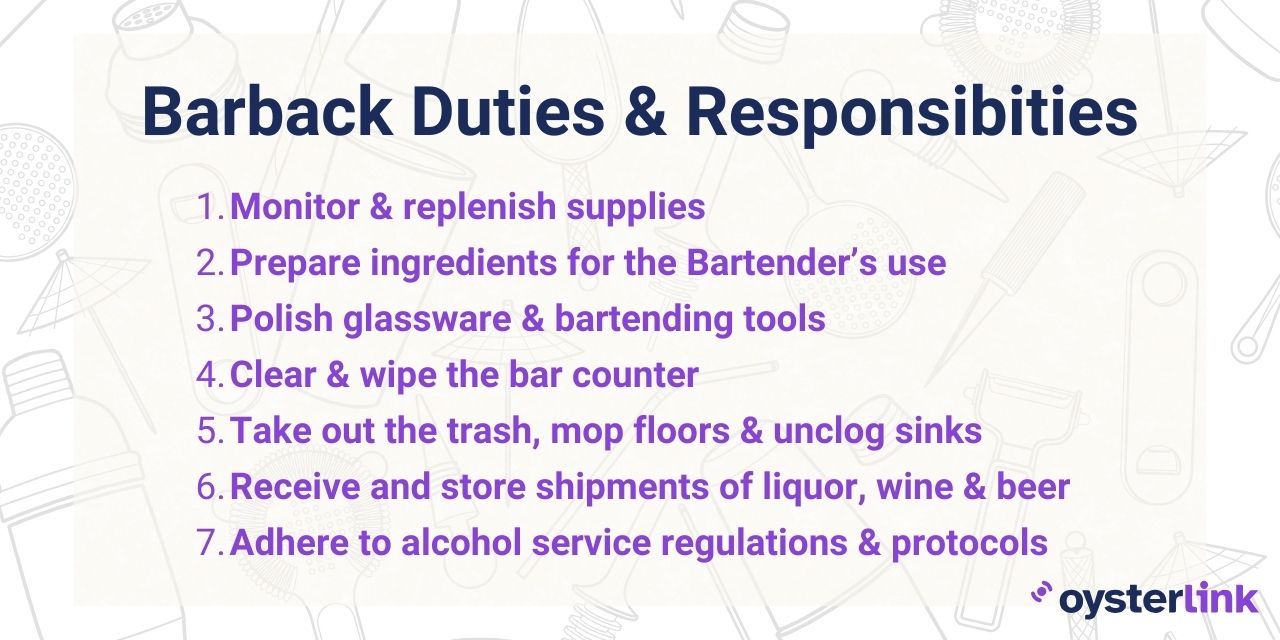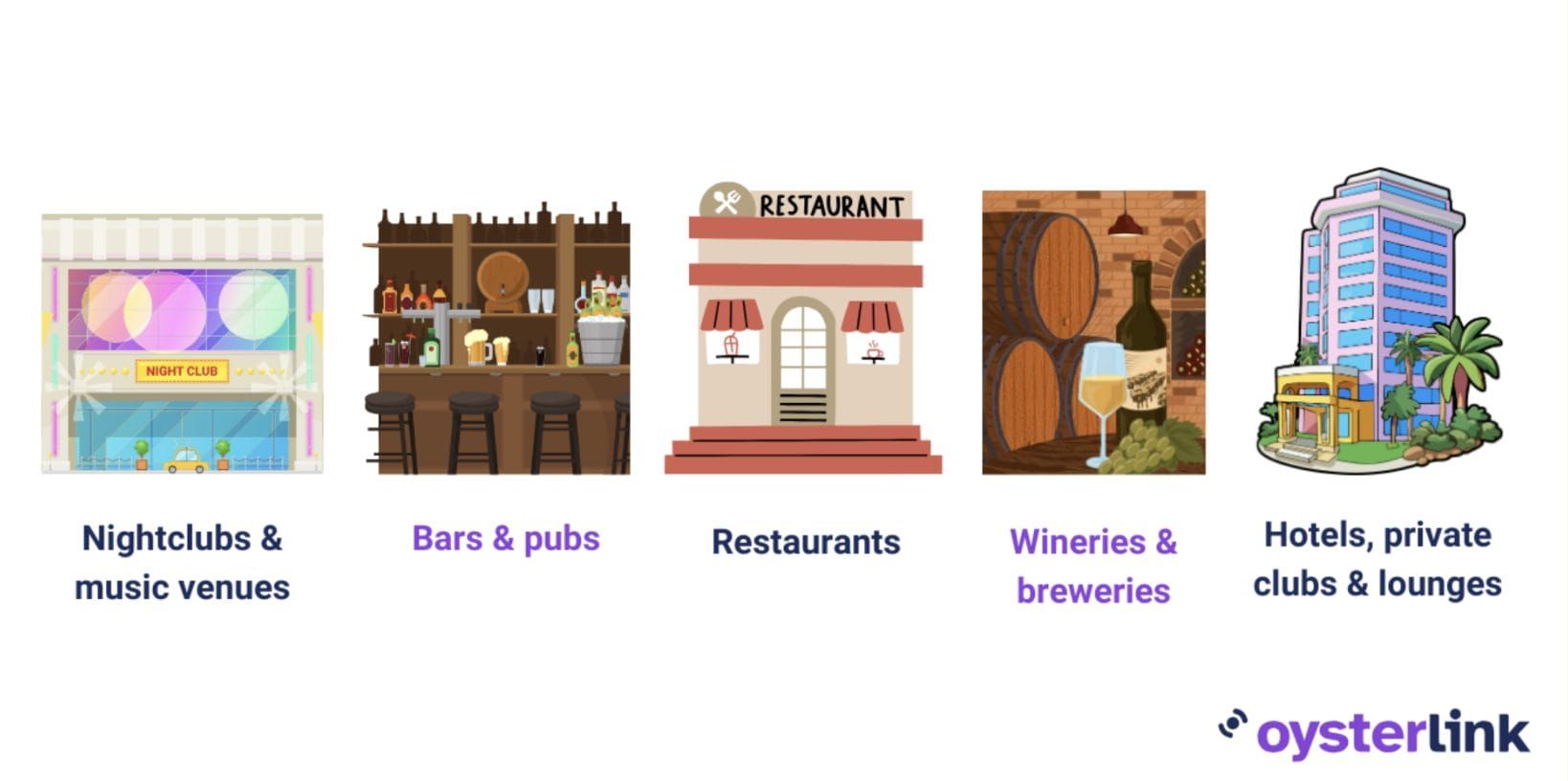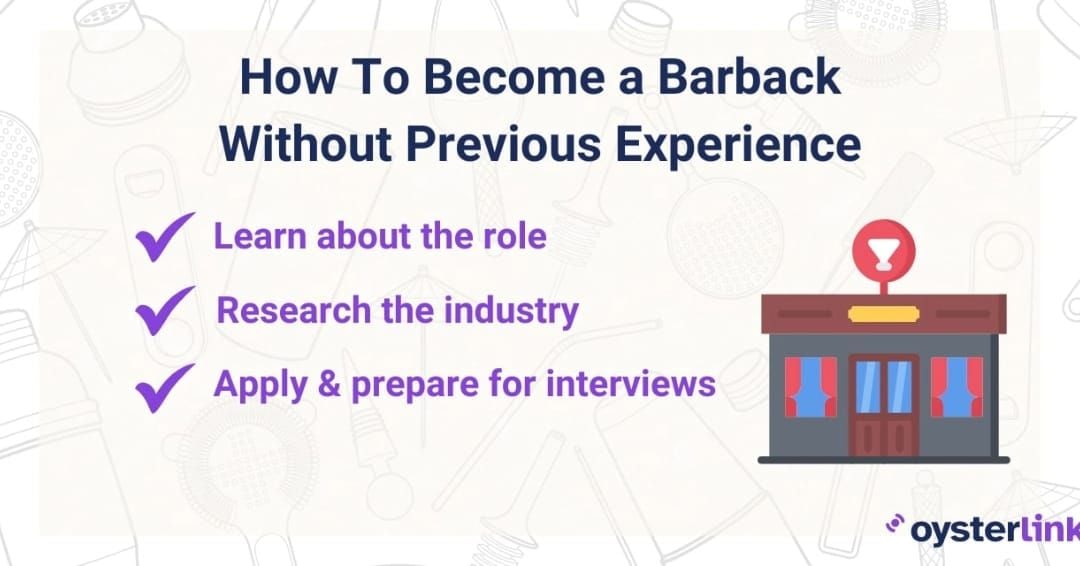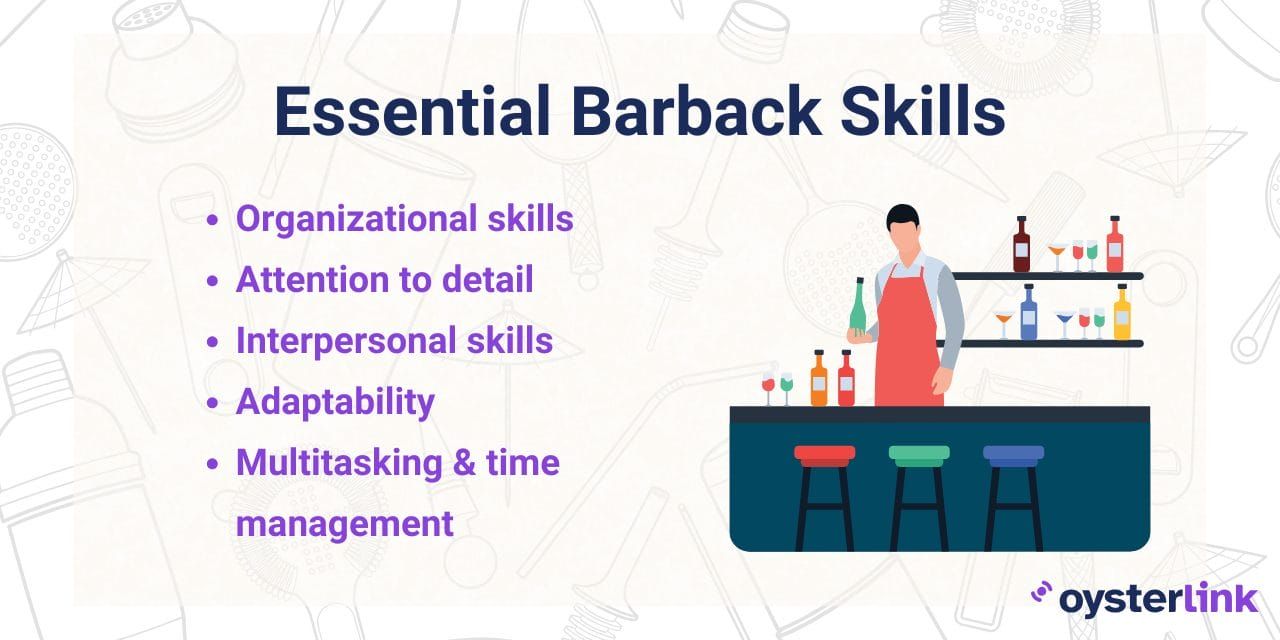Barback Career: 2026 Complete Guide
If you’re thinking about becoming a Barback, you’re probably wondering what the key duties associated with the role are and how much you can earn.
We’ll answer all that and explore everything else you need to know about working as a Barback. In addition, we’ll provide tips on how to get hired for a Barback position and eventually advance into higher-level hospitality roles.
What Is a Barback?
A Barback is a part of the front-of-house staff responsible for maintaining cleanliness and organization in the bar area.
They assist in and handle various tasks to ensure the bar operates smoothly, allowing the Bartender to focus on crafting drinks and serving guests.
In some establishments, a Barback might also be referred to as a Bartender’s Assistant, Bar Prep, Bar Runner or Bar Assistant.
What Does a Barback Do?
Common Barback duties include:
- Monitoring and replenishing glassware, napkins, coasters, liquor bottles, beer kegs, ingredients and other supplies
- Assisting Bartenders with ingredients by preparing garnishes and refilling ice bins
- Washing and polishing glassware, stirrers, shakers and other bartending tools
- Clearing empty glasses and wiping tables or counters, especially after a customer leaves
- Pouring and refilling beers and wines if needed, often during high-volume shifts
- Assist in taking customers’ orders and collecting payments during peak hours
- Taking out the trash, cleaning drink spills, clearing broken glasses, mopping floors and unclogging sinks
- Helping keep the bar stocked on supplies and receiving and storing shipments of liquor, wine and beer
- Adhering to legal regulations and safety protocols regarding alcohol service

Barback Salary in the US
The average salary for Barbacks in the United States is $31,688 base plus tips per year. However, in most cases, Barbacks earn hourly wages instead of an annual salary. That said, their average wage is $15.23 base plus tips per hour.
California tops the list as the highest-paying state for Barbacks, offering an average salary of $33,198 base plus tips per year. It is followed by Massachusetts, where the Barbacks make $32,996 base plus tips per year, on average.
Where Do Most Barbacks Work?
Barbacks work in establishments where there is a Bartender, given that these two roles collaborate closely. Nonetheless, each setting offers a unique ambiance, pacing style and clientele.
Nightclubs and music venues offer the liveliest yet fastest-paced environment for Barbacks. Here, they must keep up with the constant flow of patrons. This means efficiently assisting the Bartender in preparing orders and knowing how to communicate amidst the loud music and flashing lights.
In contrast, bars and pubs generally have a more varied pacing. While some shifts can feel as hectic as working in a nightclub, there are also slower shifts when Barbacks could work at a relatively laid-back pace.
Similarly, the pace in restaurants with a bar also depends on a Barback's shift schedule. Here, they help the Bartender serve a wider range of customers, from parents with young children to couples and friend groups.
Barbacks would then need to prepare and maintain ingredients for various drinks ranging from kid-friendly mocktails to beer and liquor.

Tasting rooms in wineries or breweries provide a quieter environment, especially during the off-season. Barbacks here assist in serving a more upscale clientele, though typically in smaller quantities, as seats are limited.
Also, since most wineries are only open until late afternoon, Barbacks would not need to work as late as they would in other places.
Barbacks in hotels, private clubs and airport lounges also work in a high-end environment that they help maintain. As they cater mostly to discerning patrons, these settings are often where they can observe how Bartenders prepare craft cocktails and other drinks that require meticulous preparation.
Pros & Cons of Working as a Barback
Before you apply for a Barback position, it's helpful to know the advantages and challenges that come with it. Here's a breakdown of the most common pros and cons.
Pros:
- No need for prior work experience: Since it's an entry-level role, most establishments accept Barback applicants without any previous experience in the hospitality industry.
- Dynamic work environment: As a Barback, each day presents various tasks and learning opportunities, from monitoring and restocking supplies to assisting Bartenders and encountering different types of guests.
- Invaluable learnings as a beginner: Barbacks are often considered the backbone of the bar, as they are crucial in ensuring smooth operations. Their multitasking role allows them to see the bigger picture, compared to Bartenders who must prioritize the customers and making drinks. When aiming to advance to the role of a Bartender, the position also helps them acquire basic knowledge of mixing drinks.
- Networking and mentorship opportunities: Working in a bar fosters a naturally collaborative environment — bar staff members need to work together closely to accomplish their respective tasks. This allows Barbacks to build professional connections and learn from experienced Bartenders who could be their mentors.
Cons:
- Lower pay: Most Barbacks are only starting out in the industry, so their wages tend to be lower than Bartenders' wages. Barbacks also rarely receive tips directly from guests and they might have limited benefits, especially if they're part-time employees.
- Irregular and late hours: Given the nature of the job and the duties they need to perform from opening to closing, Barbacks' shifts often include late nights, weekends and holidays as these are the peak times in most establishments.
- Physically demanding: Barbacks need to have a decent amount of strength and stamina since they often need to lift heavy crates and beer kegs, not to mention stand for prolonged periods of time.
- Minimal recognition: Working as a Barback could sometimes feel like a thankless job, given their behind-the-scenes role.
How To Start a Barback Career
Here are the key points to guide you in kickstarting your career in the nightlife and hospitality industry.
Education and Experience Requirements for Barbacks
There are usually no specific education requirements to become a Barback. However, some employers prefer candidates with at least a high school diploma or equivalent (such as a GED), as it shows the candidate has basic literacy, mathematical and communication skills that are necessary for the job.
That said, while having a high school diploma is not always a requirement, it would increase a candidate’s chances of getting hired.
As for experience requirements, these also tend to be lenient given that a Barback is an entry-level role. In most establishments, newly hired Barbacks receive on-the-job training, either through the Bartender or a supervisor/manager.
However, in some cases, employers prioritize candidates with some previous relevant experience. If they require experience, they usually highlight it in their Barback job description.
Age Requirements for Barbacks
Unlike the education and experience requirements, the age requirements for Barbacks are strictly followed. These vary depending on the state and/or the establishment.
In most states, 18 is the minimum age to serve alcohol. Given that serving drinks can also be part of a Barback’s duties and responsibilities, establishments often use the state-specific requirement as their basis when hiring Barbacks.
However, there are also instances when an establishment has a higher age requirement for Barbacks.
Bartenders usually obtain a TIPS certification to prove they’ve learned how to serve alcoholic beverages responsibly and are familiar with local laws and regulations regarding alcohol service.
Barbacks can opt for the same certification to increase their chances of getting hired, especially when they want to transition to the role of a Bartender.
Physical Requirements for Barbacks
Barbacking is a physically demanding job, especially during busy shifts or in establishments that get a lot of customers. It involves a lot of balancing and coordination, endurance, flexibility and standing for extended periods.
The role also entails regularly carrying heavy objects, such as beer kegs and liquor crates. Establishments usually require that Barbacks are able to lift between 30 to 50 pounds.
Other than that, there are generally no strict physical requirements for Barbacks, as long as they can handle the physical demands of the job safely and effectively.
How To Become a Barback With No Experience
Even though Barback roles are entry-level and therefore open to anyone with enough skills and qualifications, here are the steps you can take to get a headstart.
- Learn about the role: Familiarize yourself with what a Barback does so you have a good idea of what to expect.
- Research the industry: When pursuing a Barback position, it’s also important to study the bar and hospitality industry — such as career progression, ingredients in popular beverages and local and state alcohol regulations.
- Build a network: Gain further insight by talking to those with firsthand industry experience, from Barbacks to Bartenders and even business owners. Alternatively, you can join online groups and forums or reach out on social media if you don’t personally know anyone in the industry.
- Apply and prepare for interviews: At the end of the day, the best way to start is through actual Barback training and experience. Keep an eye out for Barback jobs in your area and prepare by examining the most common Barback interview questions and answers. Also, study the Barback job description thoroughly before applying and think about how your skills align with what the establishment is seeking.

See also: How To Get a Job at a Restaurant With Little or No Experience
Top 5 Skills Barbacks Should Have
To excel in their role, Barbacks must develop and hone a diverse skill set tailored to meet the demands of their typically fast-paced work environment.
We've rounded up the top five technical and soft skills that a Barback needs to thrive in their career and contribute to the success of the establishment.

Now, let's go through each one.
1. Organizational skills
These skills are especially important when it comes to managing inventory for various bar supplies and equipment, which is one of the primary Barback duties. They must know how to properly track, categorize, label and store inventory, ensuring efficient access to and retrieval of items.
2. Attention to detail
Barbacks must pay close attention to the overall presentation of the bar area to create a good impression among patrons. This includes ensuring that glassware, cutlery and surfaces are clean and polished.
3. Interpersonal skills
Successful Barbacks communicate and collaborate effectively with Bartenders and other bar staff. This is especially important when it comes to relaying information about inventory levels, customer requests and other issues that require immediate attention.
As they may sometimes be asked to serve drinks and collect payments from patrons, a good Barback should also know how to provide excellent customer service.
4. Adaptability
Nearly every Barback works in a hectic, high-stress environment. Nonetheless, they must be able to handle last-minute changes or unforeseen problems while remaining calm and professional.
5. Multitasking and time management
Barbacks are an integral part of ensuring that operations run smoothly and minimizing downtime. That said, they must know how to juggle multiple (and often simultaneous) tasks quickly and efficiently, especially during busy periods.
Career Options After Working as a Barback
For Barbacks, the most common next step would be to transition to the role of Bartender.
From there, they can advance to various supervisory and managerial roles within the hospitality industry. Below are some examples, arranged from lowest- to highest-paying.